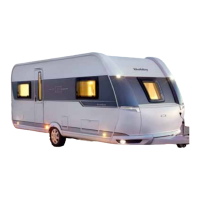Do you have a question about the Hobby 650 UMFe Prestige and is the answer not in the manual?
General information about camper development, safety, and guarantees.
Explains the meaning of various symbols and markings used in the manual.
Provides general safety advice, lists keys, emergency equipment, and fire prevention measures.
Details preparation steps for the camper before driving, covering exterior and interior checks.
Provides rules and guidelines for properly loading the camper to ensure safety and stability.
Offers advice on driving the camper, including general rules and cornering techniques.
Details procedures for parking the camper, including choosing a spot and securing the vehicle.
Discusses undercarriage maintenance and the use of original parts.
Details the main chassis beam, towbar connection, and modifications to the chassis.
Explains the function and use of the safety coupling with tracking stabiliser.
Provides instructions on how to raise, lower, and secure the front landing wheel.
Explains how to activate and release the parking brake and the rapid-emergency brake.
Details the overrunning brake system, checking equipment, and wheel brake maintenance.
Describes how to turn the rotating stanchions outward and inward for support.
Outlines the process and documents needed for registering the camper.
Explains the requirements for the mandatory biennial inspection and required documents.
Details the conditions and requirements for operating the camper at 100 km/h.
Explains the definition of various masses and weights related to the camper.
Provides guidelines on tire selection, maintenance, and initial driving with new tires.
Explains how to check tire pressure, rules for pressure, and the importance of correct pressure.
Details how to check tire tread depth and the importance of tire age for safety.
Covers rules for using different rims, wheel screws, and adjusting torque.
Provides step-by-step instructions on how to change a tire on the camper.
Explains forced ventilation systems, the impact of humidity, and refrigerator ventilation.
Provides instructions on how to open and close the external entry door.
Details how to open and close the service flap, including important closing checks.
Explains how to open and close the gas-bottle container flap and its securing mechanism.
Provides instructions for opening and closing the toilet flap.
Discusses rules for roof loads, ladder use, and safe stepping on the roof.
Explains the function of the guide rail for tents and the purpose of its seal.
Details handling considerations when a bicycle carrier is loaded and its maximum load.
Advises on assembly of roof awnings by specialists and potential performance impacts.
Explains how to operate kitchen cabinets, magnetic catches, and washroom doors.
Details the operation of the extendable media shelf and media oval.
Explains the function and operation of an extendable, pivot-mounted room divider.
Describes how to unlock and lock the optional TV mount.
Details the operation of elevating, hanging, and swivelling tables within the camper.
Provides instructions on converting seating arrangements into comfortable beds.
Covers safety aspects of children's beds, including securing windows and weight limits.
Explains how to open and close hinged windows and their safety features.
Details the operation of large and small roof bonnets, including safety instructions.
Offers crucial safety advice and notes regarding electrical installations and warning labels.
Introduces the standard control panel, its functions, and buttons for operating lights and devices.
Explains how to connect to mains power, use the circuit breaker, and disconnect the connection.
Describes how the electrical system switches between mains and battery operation.
Provides a wiring diagram for the 12V electrical installation in the vehicle.
Presents a detailed contact plan for the light control system, showing connections.
Describes special lighting features like corner lights and children's bed lights.
Explains the water supply system, immersion pump function, and rules for its use.
Details the built-in fresh water tank and the rolling waste water tank.
Guides on filling the water system, operating taps, and checking water levels.
Explains how to prepare the excrement tank and flushing water tank for toilet use.
Covers inspection requirements, regulator knobs, hoses, and installations for gas facilities.
Details the gas bottle container, its rules, and the safe handling of gas bottles.
Explains the optional external gas socket, its connection, and operating pressure requirements.
Provides general advice on built-in devices, repairs, spare parts, and compliance.
Details the hot-air heating system, including installation, operation, and safety warnings.
Explains the electric auxiliary heating system, its power settings, and operation.
Describes the electrical floor heating system, its purpose, and operational data.
Details the hot-water heating system, its modes of operation, and important information.
Explains how to fill and empty the boiler, and its operating modes on gas and electricity.
Covers refrigerator operation modes (12V, 230V, gas) and general advice.
Provides instructions for using the gas cooker before first use and safety precautions.
Explains the function of the fume hood, cleaning the filter, and its controls.
Details safety precautions and operating procedures for the oven, including ignition.
Explains how to operate the optional 230V microwave and safety warnings.
Details maintenance intervals, the 5-year leak guarantee, and gas facility inspection requirements.
Covers maintenance of the drawgear, including coupling ball care and friction elements.
Explains the initial brake inspection requirements and subsequent regular inspections.
Provides a step-by-step guide on how to replace taillight bulbs.
Emphasizes the importance of ventilation for interior climate and preventing corrosion.
Details rules for cleaning the exterior, including wash sites and types of cleaning agents.
Provides essential rules and preparation steps for winter storage of the camper.
Gives advice on using the camper in winter, focusing on heating and interior fittings.
Promotes environmentally sound practices, including waste disposal and considerate behavior.
Lists recommended tire pressures for various tire sizes used in the camper.
Tabulates weights for different camper models, including empty weight and maximum allowed weight.
Lists the weights of basic equipment and fluids required for the camper's operation.
Provides detailed technical specifications for various camper models, including axle and brake details.
Details technical specifications related to increasing the camper's load capacity.
Lists tire and rim specifications, including light alloy rim details and tire bolt torque.
Details the specifications for 12V vehicle and interior lighting, including voltage and watt ratings.
Illustrates the camper's moulding dimensions and lining design.
| Sleeping Capacity | 4 |
|---|---|
| Number of berths | 4 |
| Berths | 4 |
| Seatbelts | 4 |
| Gross Vehicle Weight | 3500 kg |
| Maximum permissible mass | 3500 kg |











